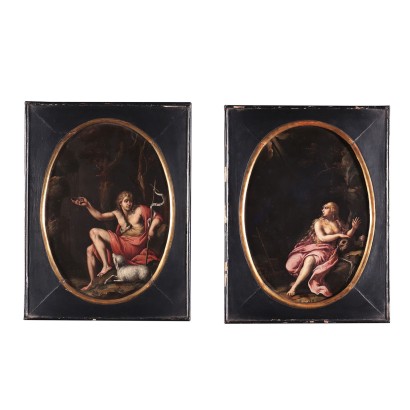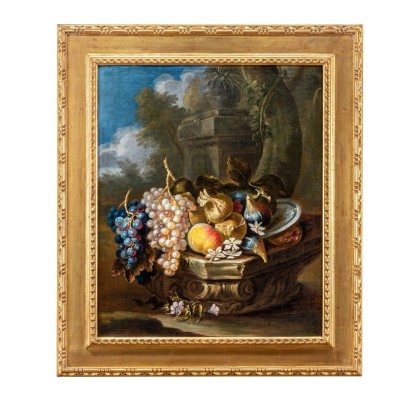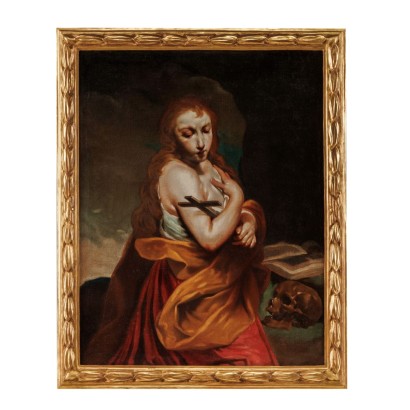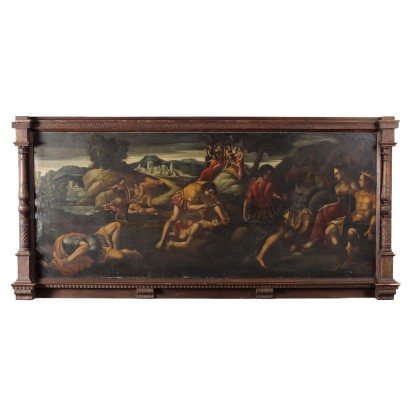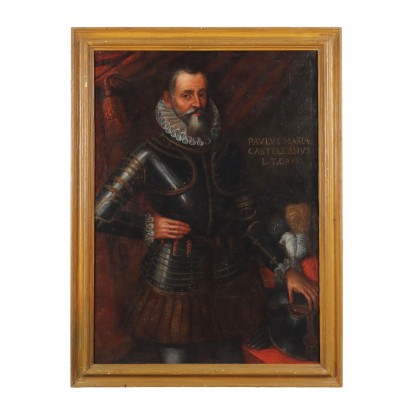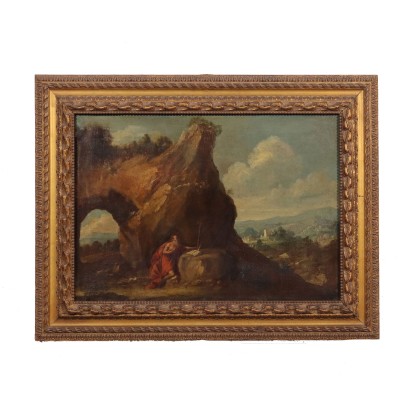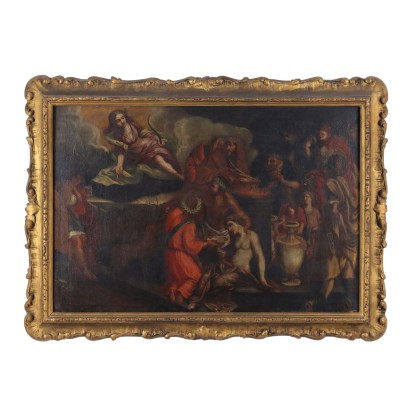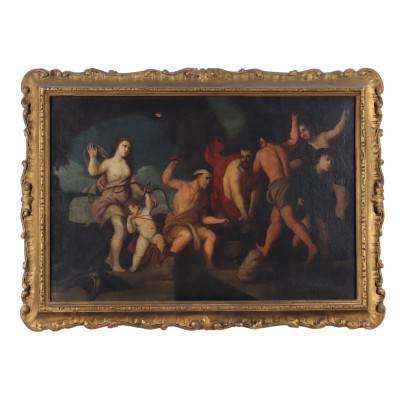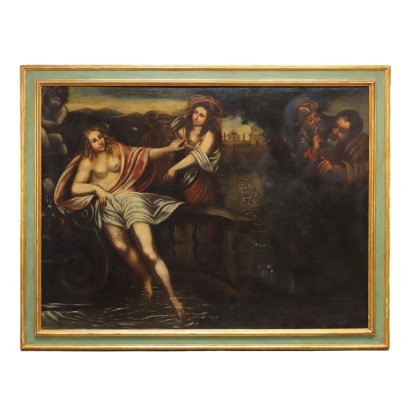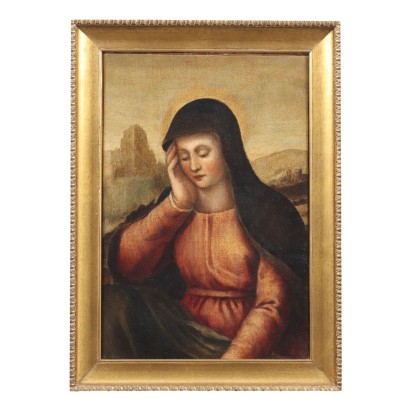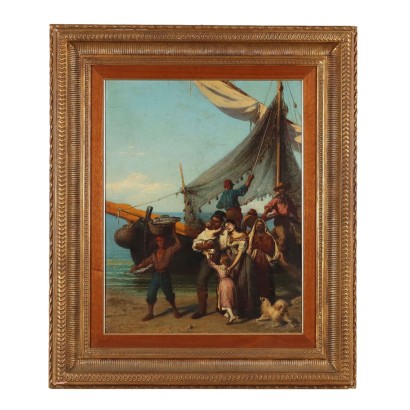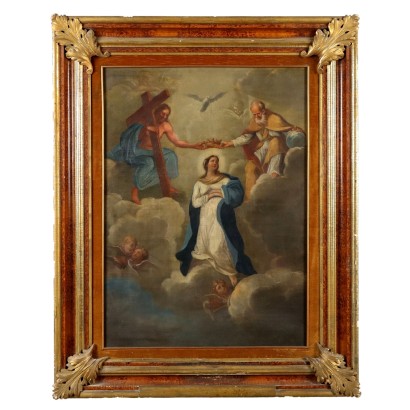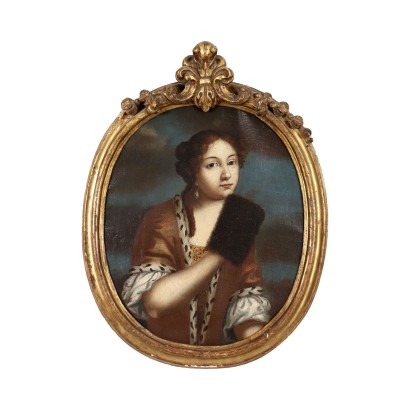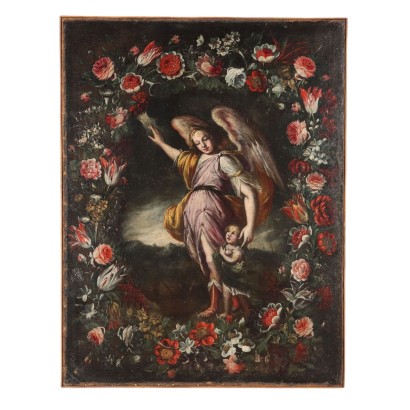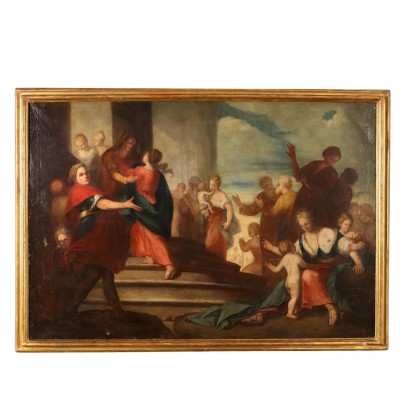Pair of Antique Paintings on Slate Religious Subject XVII Century - The Penitent Magdalene and St. John the Baptist
Features
The Penitent Magdalene and St. John the Baptist
Artwork title: La Maddalena penitente e San Giovanni Battista
Artistic school: Venetian School
Age: 17th Century / 1601 - 1700
Subject: Figures of Saints
Artistic technique: Painting
Technical specification: Oil on slate
Description : La Maddalena penitente e San Giovanni Battista
Oil on slate. Two examples of oil painting on stone are proposed here, a pictorial genre that was particularly popular in the Venetian Republic between the 16th and 17th centuries, in its form of oil painting on blackboard or touchstone. The choice of such a dark stone as a background is not only linked to practical reasons (the proximity of the mines of Brescia and Val Brembana), but, as our two works clearly demonstrate, the emergence of the figures from the dark background responds to the light also full to the new needs of the painting of the time, which in the climate of the Counter-Reformation, tended to express not only the idealized existential certainties of the full Renaissance, but also the anxieties and the opening up to new phases, already tending with Tintoretto towards greater attention to reality and luministic contrasts, to then flow overwhelmingly into seventeenth-century research strongly focused on the contrasting combination of light and shadow. The two works presented here, well within the production of the Venetian area of the first decades of the 17th century, propose two figures of saints, both hermits, placed on a dark, barely visible naturalistic background. The figure of Magdalene emerges from the darkness, leaning to follow the curve of the stone support; she is depicted looking questioningly towards the darkness, as if in a listening attitude, her left hand raised and the other resting on the remarkably shortened "memento mori". In front of her a scourge and the jar of ointment. Painted en pendant, Saint John the Baptist is represented as a young man, with a lamb at his feet, in his hand the processional cross with the banner "ecce agnus dei", while with his right hand he draws from the water source, recalling the episode that will see Jesus Christ baptized. In both paintings the figures stand out in a strong and incisive way thanks to the black that characterizes the slate plaque on which they are depicted. The two paintings, in an oval format, are presented in black wooden frames, from the late 19th century.
Product Condition:
Product in good condition, has small signs of wear. We try to present the real state as fully as possible with photos. If some details are not clear from the photos, what is stated in the description applies.
Frame Size (cm):
Height: 44
Width: 33,5
Depth: 3
Artwork dimensions (cm):
Height: 37,5
Width: 26,5
Additional Information
Artistic school: Venetian School
Age: 17th Century / 1601 - 1700
17th Century / 1601 - 1700Subject: Figures of Saints
Artistic technique: Painting
La pittura è l'arte che consiste nell'applicare dei pigmenti a un supporto come la carta, la tela, la seta, la ceramica, il legno, il vetro o un muro. Essendo i pigmenti essenzialmente solidi, è necessario utilizzare un legante, che li porti a uno stadio liquido, più fluido o più denso, e un collante, che permetta l'adesione duratura al supporto. Chi dipinge è detto pittore o pittrice. Il risultato è un'immagine che, a seconda delle intenzioni dell'autore, esprime la sua percezione del mondo o una libera associazione di forme o un qualsiasi altro significato, a seconda della sua creatività, del suo gusto estetico e di quello della società di cui fa parte.Technical specification: Oil on slate
Other customers have searched:
Pittura antica, artisti italiani, pittura olio su tela, arte 800, pittura antica, arte novecento, oggetti d'arte, ritratto di signora, dipinto animali, quadro paesaggio montano, dipinto olio su tela, dipinto antico, dipinti natura morta, quadro antico, quadro del '600, pittori italiani quadri olio su tela paesaggi, paesaggio marino dipinto, paesaggio invernale dipinto, paesaggio autunnale dipinto, dipinto di paesaggio, arte antica, quadro religioso..
Se sei un appassionato d'arte, non perderti i nostri approfondimenti sul Blog Arte Di Mano in Mano e su FineArt by Di Mano in Mano - Arte:
Leggi di più
Ecco alcuni tra i principali articoli:
Vedute
Falsi nell'arte antica
Un messaggio di fiducia per ripartire
La potenza espressiva dell'arte figurativa etiope
Breve Storia del Collezionismo
Giorgio Upiglio, maestro dei libri d'artista
Matthias Withoos detto "Calzetta bianca"
San Rocco pensaci tu - Classic Monday
Dai un'occhiata alle nostre rubriche di divulgazione sull'arte:
Epoche
Lavorazioni e tecniche
Mostre ed Eventi
Protagonisti
Se sei appassionato di pittura antica, con tutta probabilità gusterai le schede di questi stupendi quadri:
"Dio parla a Noè dopo il diluvio", Jacopo da Ponte, detto il Bassano, seconda metà XVI secolo
Crocifissione, maestro della misericordia dell'accademia, terzo quarto del XIV secolo
Erminia incontra i pastori, Camillo Gavassetti, Seconda metà anni Venti del XVII Secolo
Eroine dell'antichità, Francesco Conti, XVIII secolo
Hieronymus III Francken, La Negazione di Pietro, XVII secolo
Jefte e la figlia, Girolamo Forabosco e aiuti, XVII secolo
L'Accademia di Platone, piccolo arazzo, fine XVII - inizio XVIII secolo
Maddalena e San Giovanni Battista
Natura Morta, Bartolomeo Arbotori, XVIII secolo
Sacra Famiglia con San Giovannino, Bartolomeo Ramenghi, scuola di, prima metà XVI secolo
Testa Femminile, Andrea del Sarto, ambito di, post 1522
Uva, fichi, melagrana e pesche su un capitello - Maximilian Pfeiler, primo quarto XVIII secolo
Sapevi che l'arte può essere anche un ottimo investimento (e non solo per grandi portafogli)?
L'Arte tra Collezionismo e Investimento
FineArt: Arte come investimento
Leggi di più
Ecco alcuni tra i principali articoli:Vedute
Falsi nell'arte antica
Un messaggio di fiducia per ripartire
La potenza espressiva dell'arte figurativa etiope
Breve Storia del Collezionismo
Giorgio Upiglio, maestro dei libri d'artista
Matthias Withoos detto "Calzetta bianca"
San Rocco pensaci tu - Classic Monday
Dai un'occhiata alle nostre rubriche di divulgazione sull'arte:
Epoche
Lavorazioni e tecniche
Mostre ed Eventi
Protagonisti
Se sei appassionato di pittura antica, con tutta probabilità gusterai le schede di questi stupendi quadri:
"Dio parla a Noè dopo il diluvio", Jacopo da Ponte, detto il Bassano, seconda metà XVI secolo
Crocifissione, maestro della misericordia dell'accademia, terzo quarto del XIV secolo
Erminia incontra i pastori, Camillo Gavassetti, Seconda metà anni Venti del XVII Secolo
Eroine dell'antichità, Francesco Conti, XVIII secolo
Hieronymus III Francken, La Negazione di Pietro, XVII secolo
Jefte e la figlia, Girolamo Forabosco e aiuti, XVII secolo
L'Accademia di Platone, piccolo arazzo, fine XVII - inizio XVIII secolo
Maddalena e San Giovanni Battista
Natura Morta, Bartolomeo Arbotori, XVIII secolo
Sacra Famiglia con San Giovannino, Bartolomeo Ramenghi, scuola di, prima metà XVI secolo
Testa Femminile, Andrea del Sarto, ambito di, post 1522
Uva, fichi, melagrana e pesche su un capitello - Maximilian Pfeiler, primo quarto XVIII secolo
Sapevi che l'arte può essere anche un ottimo investimento (e non solo per grandi portafogli)?
L'Arte tra Collezionismo e Investimento
FineArt: Arte come investimento
Product availability
Immediate availability
Ready for delivery within 2 working days from ordering the product.



